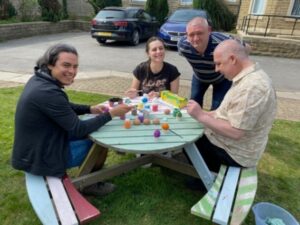
The family and friends of those requiring support on their recovery journey, due to a mental health diagnosis, autism and/or learning disability are integral to their well-being and safety – their relationships with loved ones outside of their home underpin who they are and remain just as important as when they first move into the service.
Consistent communication and conversations with families and friends provide the foundations of solid support for residents. Those close to our residents know them and have their best interests at heart, and in addition to this, residents struggling to express themselves may often rely on those close to them to communicate their wants and needs. You can find more information on how to advocate for your loved one here.
If you have a friend, family member or loved one planning to move into supported living, here are some practical tips to help you.
If your loved one is moving into supported accommodation, make the effort to help them get settled in. Coming from any setting, whether inpatient or their own home, can be daunting but your loved one has the support of our caring team to help them transition seamlessly – they may have the option of a phased transition. In addition to this, they can meet the team beforehand to ease their nerves, support teams will always work with your loved one to understand any routines or communication preferences.
Help them choose their bedding, decorations and personal touches – this way it’ll feel like a home away from home. Encourage them to really make the space their own!
This goes without saying but always keep up with what your loved one is getting up to.
Help them on their bad and good days, encourage their hobbies, check in with them frequently, and invite them out.
Being interested in their day-to-day will assure them that you’re there for them, no matter what.
Encourage your loved one to engage in fun activities taking part within the service such as gardening, arts, crafts and baking – all of which can help provide stress relief to those partaking (you can read more about the benefits of baking for mental health here).
At each of our services, there is a jam-packed schedule of therapeutic activities for your loved ones to participate in, both within the service and out in the community. This may be obvious but always make sure to include your loved one in fun activities outside of their living space. Family and social events help keep them involved with what’s happening in their personal life, and ensure they feel included.
Trips to the cinema, meals out, day trips and even supermarket jaunts will be sure to keep them engaged and maintain the level of inclusion they would have by living at home, or close by. It’s key to remember that socialisation is very important when considering your loved ones’ recovery as it’ll help them integrate and make friends outside of their family unit.
You should also encourage your loved one to have you round (if they’re comfortable) – they can cook for you, show you their space and introduce you to the other residents and our support team.

Always celebrate their milestones – whether it’s their birthday, a key date in their life or a special occasion. Your loved one is on a journey to greater independence and it’s important to acknowledge milestones within their life.
Take them a cake round, send a card, take them out or just give them a call.
Halloween, Bonfire Night, Christmas, Easter, the list goes on!
Make plans with them to enjoy all the seasonal festivities that life brings – it’s a great excuse to get them out and about with extended friends and family. There’s nothing better than spending time with family and friends around the holidays…

Your loved one will have a number of challenges whilst on their recovery journey, it may be useful to help them set personal goals to combat said challenges.
Help them set small achievable targets and support them to reach their goals – they will be thankful for this in the long run.
Setting healthy habits and working towards goals will help your loved one stay positive and have something to look forward to – this could be them wanting to get a part-time job, study at school or college, take up a new hobby or even exercise.
Reading inspiring stories about recovery journeys may help your loved one to identify and work towards their goals. Read Usman’s journey to Merchants House and his advice for anyone struggling with their mental health in his words here.
This is arguably the most important tip – communication.
Always keep in touch with your loved one, you are their most trusted advisor.
This applies to those in supported living, and those simply away from home, as it’s very easy to get carried away with life but whether in person, or via social media/telephone, make sure to check in to ensure they feel loved and supported. Thankfully, due to the advances in technology, it’s much easier to keep in touch with your family and friends – stay connected the best you can. Here are some practical tips to help you stay in touch through technology.
Thank you for reading and we hope you found the above tips useful – we’d love to know if you have any to share.
Connect with us on social media and let us know how you support your loved ones from afar. You can find us on Facebook, Twitter, LinkedIn or Instagram.
At Northern Healthcare we work closely and collaboratively with our residents, their families and adult health and social care workers to ensure that each person has a strong support network to help sustain their recovery journey.
Read more about our support model and how we help to cultivate a strong support network and how we help to cultivate a strong support network.